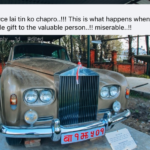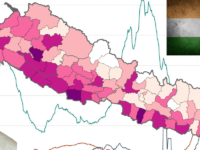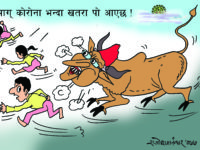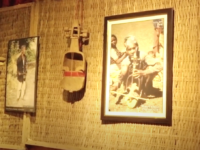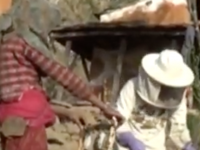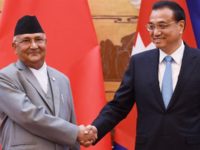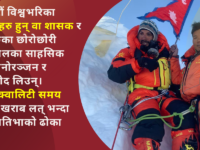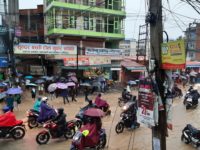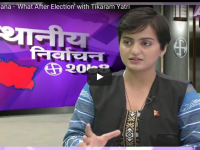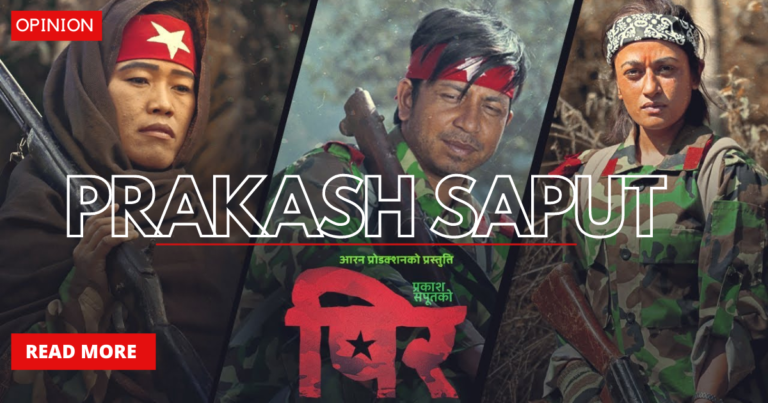Ever since the release of the song called “Pir”, it has been trending and making waves on social media and current topic. The 16:25 minutes song by Prakash Saput is more like an episode of a tele serial and rightly so, since the second part is also informed to be coming. What the controversy about this song is easy to understand since it is totally political in its theme, based totally on the Maoist insurgency that lasted more than a decade in Nepal and managed to totally change the nation that we see now.
In its essence, the song is a little different in that it is so long and it is telling the story of a couple who wed during the fighting days and are now struggling to make the ends meet. Since the man, who limps, is stubborn about not leaving the country, the wife who carried a bullet wound in her stomach, decides to go work abroad, leaving her little girl with the husband.
The portrayal of a family’s economic difficulties despite having one’s own meat shop, then decision to go for work abroad is serially portrayed starting with the obtaining the passport, going through the consultancy, and the poignant separation with the little child at the airport. Then there is no communication for three months, only to find another former Maoist combatant working as a prostitute and then return home to see the news about his wife being held a captive and pleading to return home. The last part in this episode portrays how the former combatant colleague, who is now a minister, being uncooperative to assist him, throwing away his letter and riding off in his posh SUV. The song ends with the question whether they will meet ever again. So, we can wait for this song-storys next episode, while the controversy surrounds this video.
It was released and caused the controversy right away. I had heard some statements about it from former Maoists, and threats upon the creator. Four days after the release, when I watched the video, it had been trending at number 1 with more than 5.6 million vewers already, meaning more than a million views per day. That itself speaks volume regarding how people are resonating to the theme and the story portrayal. Myself, I found the acting very natural and believable.
The most painful moment in the story for me was when the little daughter asked her father “देश भनेको के हो?” The father himself is perplexed by the question and speechless to answer. Really, what is a nation? It is definitely not the same as a country. If you really ponder the question, you might come to a conclusion that there is no “desh” remaining that can be called Nepal. The Nepal that I grew up is not the same that I am witnessing now. It fundamentally altered. The question arises, and it is a moot question asked everywhere of anything: Are we better now?
The undeniable answer is: Absolutely NOT. The portrayal of working abroad as the primary solution for economic problem itself speaks volumes. Let us not forget that this whole idea of working abroad is the result of Maoists’ decade long war that drove people away from their villages and seek safety and livelihood in the deserts of the Gulf countries or the inhumane and deplorable working conditions of Malaysia, and such countries, fully exposed to exploitation of the workers. The only supposedly positive logic of the proponents of this war seems to say that Nepal is not a republic, which the husband also recited without convincing his wife, and the people in the media seems to tout “freedom of speech.” Really? If so then why are they threatening the creator? Isn’t that a juxtaposition? It defeats their own logic.
So, yes, maybe few noted people and primarily the Prachanda family might have reaped the economic benefit from the war, but majority of the fighters are no better off, many of them are going through psychological and physical disability. Personally, I do know only one law of Karma. Whoever supports sinful people and activities will have to hear the fruit of their action. It is the teaching and lessons of the Nepal I used to know. Not the one I am living in now.
The writer is a graduate of Arizona State University in Political Science. He is working as a social activist and motivational speaker for students across Nepal since 2007.
The views and opinions expressed in this article are those of the author and do not necessarily reflect the official policy or position of Nepalisite.


